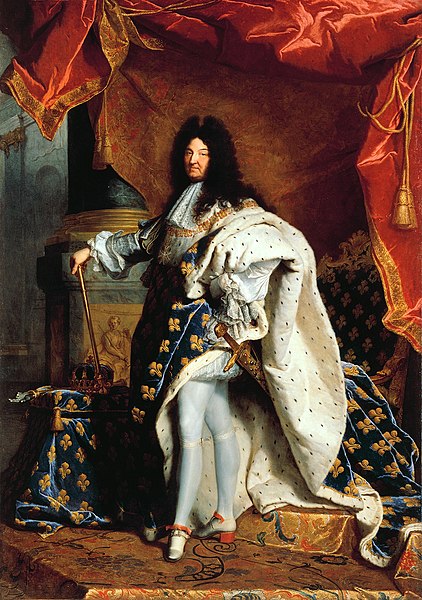Not the best documentary ever. Hokey in parts. But some good images and discussion of basic facts. 1 hour.
Category: World Civ-Absolutism
Lecture: Louis XIV, Sun King
Here is my lecture on the Sun King. The basic outline is as follows:
- Introduction
- Law & Order
- Control Nobles
- Economic Reform
- Patronage of the Arts
- Versailles
- The Church
- Army & Foreign Policies
Duc de Saint-Simon: The Court of Louis XIV
The Duc de Saint-Simon resided for many years at Versailles. He left an account of Life there
His natural talents were below mediocrity; but he had a mind capable of improvement, of receiving polish, of assimilating what was best in the minds of others without slavish imitation; and he profited greatly throughout his life from having associated with the ablest and wittiest persons, of both sexes, and of various stations. He entered the world … at a fortunate moment, for men of distinction abounded.
… Glory was his passion, but he also liked order and regularity in all things; he was naturally prudent, moderate, and reserved; always master of his tongue and his emotions. Will it be believed? he was also naturally kind-hearted and just.
Reign of Louis XIV, Sun King
Louis’s main achievements were expanding the effectiveness of the central government, increasing the boundaries of France to the north and east, and placing one of his grandsons on the throne of Spain. But these successes cost the nation dearly. The economy suffered during the long years of war, taxes increased, and the countryside was left vulnerable to punishing famines.
Read this summary of Louis’ Reign and respond to these questions.

French Absolutism in the Ancien Regime
- The Creation of Absolutist France
- The Sun King
- Bishop Jacques Bossuet: Political Treatise on Kingship
RG Reading Guide - Jean Domat (1625-1696): On Social Order and Absolute Monarchy, 1697
RG Reading Guide - Louis XIV: Letter to the Town Officers and People of Marseilles, August 26, 1664
- Louis XIV: Revocation of the Edict of Nantes, October 22, 1685
- Duc de Saint-Simon: The Court of Louis XIV, from Memoires
- Comte de Saint Simon: Memoires of of Louis XIV
- The Duchess of Orleans: Versailles Etiquette, 1704
- Louis XIV: Accounts
- Bishop Jacques Bossuet: Political Treatise on Kingship
Germany Permits Itself to Celebrate Prussian King
The official delegation honoring Frederick the Great’s 300th birthday had just finished laying a laurel wreath and a grand cross of white flowers at his grave here on Tuesday when a 70-year-old retiree quietly slipped in behind them and placed a small potato on the gray slab of stone that marks the monarch’s resting place.
Read this piece from the NY Times on the Fredrick Celebration and respond to these questions
Niccolo Machiavelli – the Cunning Critic of Political Reason
Customarily, the name ‘Machiavelli’ was a synonym for the devil. The myth of the corrupt immorality of Niccolo Machiavelli (1469-1527) has lasted for many centuries, the description ‘Machiavellian’ being used today for anyone who is seen slyly to manipulate a given situation to their own advantage by means of shrewd political insight. Machiavelli as an individual has been described as aloof, as standing to one side of life ‘with a sarcastic expression continually playing around his mouth and flashing from his eyes’. This reputation is based on Machiavelli’s most famous work, The Prince, which was written in 1513-14.
However, is Machiavelli’s lasting reputation as the philosopher-king of political manipulation really justified? This article re-examines Machiavelli’s work and legacy and comes to some surprising conclusions. It also suggests a number of different ways to interpret Machiavelli’s political ideas.
Vincent Barnett reveals that there is more to Machiavelli than his notorious reputation. (History Today)
Popular Revolts in Normandy
The popular revolts of 1578-79 and 1586-89 in Normandy were triggered by an unruly military presence and the high level of royal fiscal exactions. Joan Davies shows how the revolts were exploited by the nobility in their struggle with Henri III, who met the threat thus posed with force. (History Today)
King Henry II
December 19th, 1154: a reddish haired, quick-tempered and hyper-active young man was crowned at Westminster Abbey as King Henry II. Although in December 1154, Henry was generally recognised as the legitimate claimant to the throne, most notably by the English Church, his accession was fraught with perils.
Nicholas Vincent celebrates the founder of the Plantagenet dynasty.
The Norman Conquest of the English Language
At first the English withstood the Norman attack of 1066. But soonthey succumbed to the invaders, as did their virile language of record. An article by H.R. Loyn. (History Today)
Modern History Sourcebook: The Decline of the Holy Roman Empire and the Rise of Prussia, 1700-1786
Short source excerpts:
- Samuel Pufendorf: History of the Principal Kingdoms, 1700
- Count von Seckendorf: On Frederick William I
- Isaac Isaacsohn: History of the Prussian Civil Service
- Letters of Prince Frederick and Frederick William I
- Frederick II (1740-1786): Memoirs
- Frederick II (1740-1786): Essay on Forms of Government
History of Friedrich II of Prussia, Called Frederick the Great
History of Friedrich II of Prussia, Called Frederick the Great is a 21-book history by Thomas Carlyle.
It has now been placed on-line by volunteers at Project Gutenberg. They have created separate files for each book.